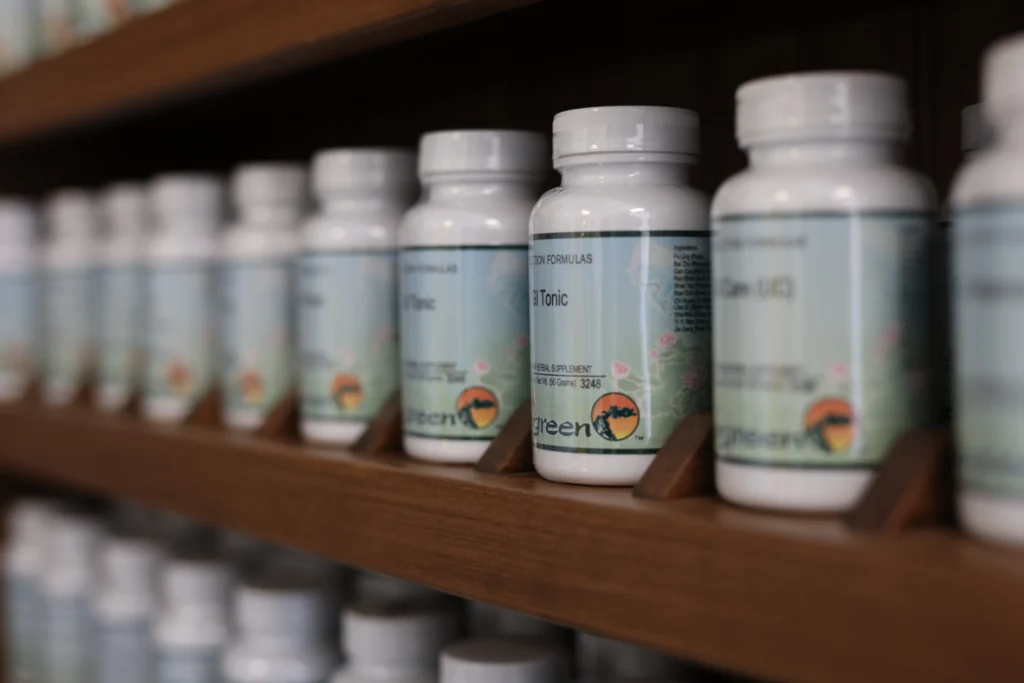Chinese Herbal Medicine: Practical guide to use, safety and benefits
Chinese herbal medicine, also known as Chinese medicinals, is a central pillar of Traditional Chinese Medicine (TCM). Unlike generic supplements, TCM herbal formulas are prescribed after a thorough evaluation by a licensed TCM practitioner. When individualized to the patient’s condition, these formulas can support balance in the body’s internal systems while minimizing risks.
According to the Mayo Clinic and the National Center for Complementary and Integrative Health (NIH), many herbal remedies can be safe when used under professional guidance, though proper dosage and monitoring are essential.
How to take Chinese Herbs (Evergreen Capsules)
For Adults
Standard dose: 6 capsules twice daily or 4 capsules three times daily.
Take capsules 20–30 minutes before meals or at least 2 hours after large meals with a small glass of warm or room-temperature water.
If you are particularly sensitive to medication or supplements, start with a reduced dose for several days before moving to the full amount. Always notify your practitioner before making dosage changes.
For Children
Dosage is based on body weight and must always be determined by a qualified TCM practitioner.
Children may begin taking herbs once they can safely consume the powdered contents of a capsule mixed into yogurt, applesauce, or similar soft foods.
The practitioner will calculate the exact dosage according to the child’s weight and overall health needs.
Consistency is key: take your capsules at the same time each day for best results.
2. Possible Side Effects of Chinese Herbal Medicine

One of the distinguishing features of Traditional Chinese Medicine herbs is their emphasis on safety and minimal side effects. Most TCM herbal formulas, including Evergreen capsules, are generally well tolerated. Still, some mild and temporary effects may occur, such as:
- Minor digestive changes (bloating, loose stools)
- Subtle shifts in energy levels or sleep patterns
If discomfort persists, or if unexpected symptoms such as rash, persistent digestive upset, or changes in appetite occur, contact your practitioner immediately.
Recent clinical evidence supports both the safety and effectiveness of Chinese herbal medicine (CHM) when prescribed and monitored by licensed practitioners. For example, a meta-analysis of 56 randomized controlled trials found CHM to be effective and safe in reducing symptoms of knee osteoarthritis, with only minimal side effects reported (PubMed). Similarly, systematic reviews have shown that CHM, when combined with conventional Western medicine, demonstrated promising efficacy and safety for patients with mild to moderate COVID-19 (BMC Complementary Medicine and Therapies, PMC).
These findings highlight that, when formulas are properly individualized based on TCM diagnostic methods (such as pulse and tongue assessment, health history, and lifestyle evaluation), they can provide real clinical benefits with a favorable safety profile.
For best results, always work with a licensed TCM practitioner who can select the correct formula, determine the optimal dosage for adults or children, and monitor your progress over time.
3. Why TCM Herbology Is Different
What sets Chinese herbal medicine apart from conventional supplements or pharmaceuticals is its holistic and individualized approach:
Whole-person focus: The goal of TCM herbal formulas is to correct underlying imbalances in the body, rather than simply suppressing symptoms.
Individualized prescriptions: Two patients with the same Western medical diagnosis may receive entirely different Chinese medicinals, because TCM treatment is based on their unique pattern of imbalance.
Rigorous evaluation: Practitioners use diagnostic tools such as pulse and tongue assessment, health history, and lifestyle factors to select the most appropriate formula and dosage.
Evidence-backed tradition: Modern research has shown that personalized Chinese herbal formulas can provide measurable clinical benefits, particularly when guided by licensed practitioners (PubMed).

4. Where Chinese Herbal Medicine Is Most Useful
Chinese herbal medicine is especially effective for internal disorders—conditions that affect multiple systems or involve deeper functional imbalances. Clinical studies and centuries of use highlight its supportive role in the following areas:
Digestive Function
Improves nutrient absorption and supports gut balance
Reduces bloating and irregular bowel movements
Promotes steady energy through more efficient digestion
Respiratory Health
Helps clear lingering congestion
Reduces recurrence of mild respiratory issues
Supports seasonal respiratory resilience
Endocrine and Metabolic Balance
Stabilizes hormonal fluctuations
Supports healthy fluid balance and energy regulation
Can complement lifestyle measures for metabolic wellness
Immune Support
Maintains immune readiness during seasonal changes
Promotes faster recovery from mild illness
Studies suggest that CHM can safely enhance immune resilience when used alongside standard care (PMC)
Emotional and Mental Well-Being
Promotes steadier mood and energy levels
Helps reduce low-grade restlessness, fatigue, or tension
Holistic formulas are often combined with lifestyle recommendations to support mental balance

The Bottom Line
Traditional Chinese herbal medicine is not a one-size-fits-all supplement—it offers targeted, personalized prescriptions designed to meet your specific health needs. When taken as directed and as part of a comprehensive treatment plan, Chinese medicinals can deliver broad and lasting benefits with minimal risk.
At Sun Acupuncture, we believe in the transformative power of Chinese herbs when carefully selected and tailored to each individual. Whether you’re seeking support for digestion, immunity, energy, or overall balance, our team is here to guide you with safe, effective, and personalized care.
Discover how Chinese herbal medicine can help you restore harmony and well-being—schedule a consultation with Sun Acupuncture today and experience the difference of natural healing rooted in tradition.

